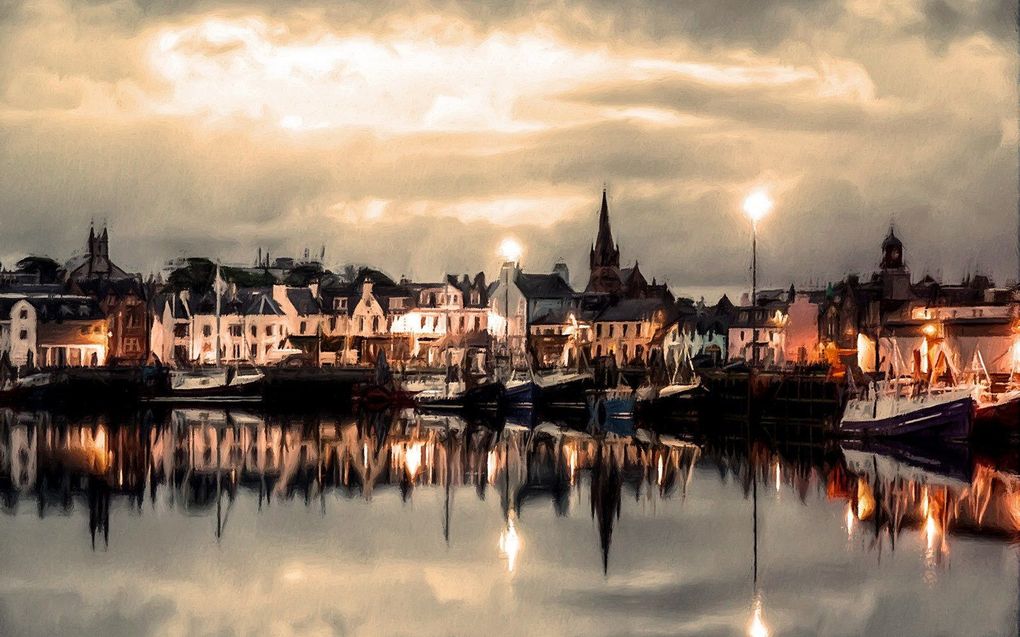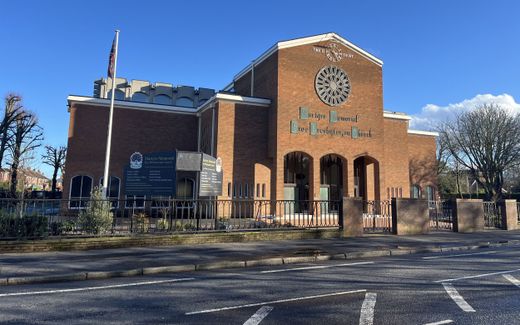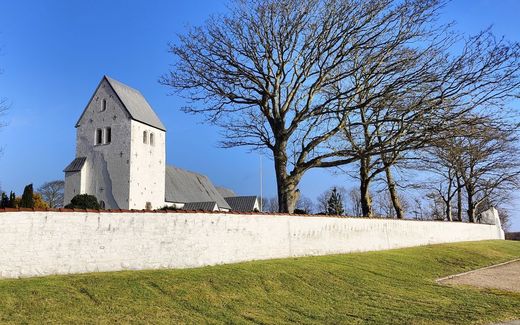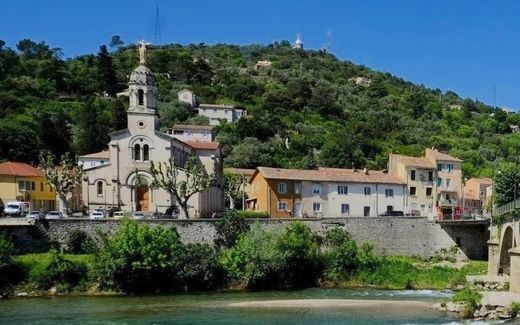Biblebelt feature: Sunday is still peaceful on the Scottish Isle of Lewis
21-08-2024
Western Europe
Maarten Stolk, RD

Painting of the harbour in Stornoway, the capital of the isle of Lewis. Photo Thomas Eichmann
Western Europe
Stornoway counts at least 14 churches. The windy capital on the Isle of Lewis is the heart of Scotland's Biblebelt. But here, too, time is ticking. "The Gospel came late and therefore leaves late."
On Sundays, the streets of the town of Stornoway, which has 7000 inhabitants, are virtually deserted. Perhaps a few tourists, hungry and thirsty, walk past the closed shops. Everything is closed except for a petrol station, a clothes shop and the hotels.
Sunday closure on Lewis, the northernmost island of the Outer Hebrides, is still widely supported. One of the biggest upheavals was the first Sunday flight at Stornoway Airport in 2002. The peaceful protest by Rev David Murray, then pastor of the Free Church (Continuing), was to no avail; at the airport, a cheering crowd welcomed the first plane. Since 2008, ferries have also operated there on the Sabbath, as the Scots call Sunday.
Lewis is the windiest part of Britain, weather experts say. The sky is grey, the houses are drab, and the few trees in the otherwise empty moorland are bent towards the northeast, notwithstanding centuries of headwinds from the Atlantic.
Wind
The spiritual revivals on the Scottish island of Lewis can hardly be counted. As recently as 2005, there was a remarkable revival: schoolchildren, especially boys, suddenly started attending prayer meetings.
Western Isles Properties sells houses on the island. The estate agent on Cromwell Street in Stornoway advertises a bungalow on Church Street in Borve, on the north-west coast of Lewis: the property 'benefits' not only from 'a hedge and trees' that break the wind but also from 'churches' nearby.
And there are plenty of those, especially in Stornoway. On any weekday, you can go somewhere for a church service or "prayer meeting" with psalmody and a sermon. The gravel stone building of the Free Presbyterian Church on Matheson Road shrouds itself in various shades of grey. Only a bright blue poster of the Trinitarian Bible Society brings some colour. And an important message: "Christ was once offered to bear the sins of many."
Organ
Inside, in the pale yellow-painted church hall, 13 people sit in brown wooden pews on a Thursday evening in June. Ten men and three women; the latter with heads covered. There is no organ or other musical instrument.
Elder Finley Campbell is the precentor of service. We hear Psalm 89:11 from the 1650 Psalter. At the second word of each phrase, the congregation joins in. "The heav'ns are thine, thou for thine own the earth dost also; The world, and fulness of the same, thy pow'r did found and make."

Singing continues until the 28th verse, interrupted only by four male members of the congregation offering prayers. For forgiveness of sins, for the Jewish people, for young people in the congregation.
Reading a sermon no longer works very well for elder William Mackay, so he meditates on his own. About Christ's love for sinners, visible in His death on the cross. He drank the cup of God's wrath to the last drop. "The worst sin is to despise the blood of Jesus Christ," Mackay says.
Preparations
A few streets away, just past the house where English preacher Arthur W. Pink lived until his death in 1953, the grey church building of the Free Church has stood since the mid-nineteenth century. Inside, Mr. James Maciver (70) is making final preparations for a church member's funeral the next day. The following Sunday, he delivers his last sermon as pastor of the congregation, the largest within the denomination created in 1843. Then retirement awaits.
The church building can fit 1,100 people. Thirty or forty years ago, it was full, Maciver knows, as he walks to an adjacent hall, where 80 children and young people aged 8 to 15 will attend Sunday school in a few days' time. "Now about 300 come, and 50 to our building on Francis Street, where services are held in Gaelic. By the way, this language is spoken less and less on the island."
The congregation is shrinking, Maciver says, even though it is not going fast. People are joining, and ten children are baptised a year. "But I did manage 286 funerals in the eight years I was pastor here," he says.

Office for life
Then, off to the spacious church council room, where dozens of chairs are arranged around tables in a square. "We have 33 elders and 24 deacons," says the pastor. "Not all of them are active anymore, mind you. But with us, you remain in office for life."
Maciver sees the rather isolated Isle of Lewis, which was relatively late –from about 1820– in becoming orthodox, slowly changing. Especially in education in state schools, which he says is not free of LGBT propaganda. "That would never have been the case a few years ago," he says.
Yet far from all parents send their children to the only Christian school in Stornoway, the unsubsidised Providence Christian School. "Most church members want to maintain the influence of Christians in the state schools," says the minister.
Cruise ship
Although church attendance is declining, Sunday peace remains "reasonably intact", believes the Free Church pastor. "Sometimes there is an attempt to open the sports hall or swimming pool on Sundays, but fortunately, the local government has never changed its position."
This Thursday, the Seven Seas Splendors lays in the dark waters of Stornoway's outer harbour. It is ten storeys high, and hundreds of tourists are in the belly of the cruise ship. Before Sunday, it left again. "We made enquiries with the port authority last year," says Maciver. "We asked what their policy was regarding ships coming in on Sunday. Their answer was that they tell the big cruise lines that almost everything here is closed on Sundays. So, most sail through."
"Sabbath rest is a great blessing"
From the Scottish mainland, it takes almost three hours of sailing to reach the island of Lewis in the Outer Hebrides. Yet 'worldliness' is taking hold there too, observes Dr Robert Dickie (69), a retired doctor and elder at Free Presbyterian Church (FPC) in Stornoway.
Church history has his heart. Dickie delved into the history of the Scottish Church in Rotterdam, Holland, wrote about six converted Jewish pastors of the Free Church of Scotland in the nineteenth century and debunked the 'popular theory' that Scottish pastor Robert Murray McCheyne was engaged twice.
In the Scottish Reformation Society Historical Journal, he published an article on the failed attempts in the 1930s to merge the Dutch Reformed Congregations (Gereformeerde Gemeenten) with the Free Presbyterian Church of Scotland, among others. The differences proved too great: the Scottish church, to this day, gives women the right to vote in the congregation (a legacy of the famous preacher Ebenezer Erskine, among others), rejects musical accompaniment in the church service and does not celebrate Christmas and Easter. Surely, this was a step too far for the Synod of the Dutch Reformed Congregations, with Rev G.H. Kersten leading the way.

Elder Dickie's congregation in Stornoway, including the 'preaching post' in Achmore, 18 kilometres away, has over 80 people. About 45 of them attend the Sunday services, in which Dickie sometimes reads a sermon. "Spurgeon, Halyburton, the Erskines and McCheyne, along with many other Scottish preachers," he says. Rev James Tallach, the pastor of the FPC, retired earlier this year.
According to a recently published census, the Western Isles are the most Christian part of Scotland, with 63.6 per cent of the population calling themselves Christian. Do you see secularisation on the Isle of Lewis?
"Reformed, conservative religion did not come to the Western Isles until the nineteenth century. It is sometimes said, "The Gospel came to Lewis late and therefore leaves late."
Yet there have been many changes in Scotland's religious character in recent decades, and this has also affected Lewis. Worldliness, including religiousness, exerts great influence. Church attendance is falling in many parts of the island, congregations are ageing, and fewer and fewer young people are attending church. The Lord's Day is less strictly observed, and interest in the Reformation and solid Reformed literature is also declining. These changes can also be seen in the way some people dress when they attend church. Compared to the past, relatively few children and young people attend Sunday school, and there is less opposition to godless, secular school education. Television, and other worldly forms of entertainment, has promoted secularisation."
The Isle of Lewis was known for strict Sunday observance. How is the situation now?
"These days, ferries sail, and planes fly on the Sabbath, the Lord’s Day. Most shops on the island are closed, but some restaurants open their doors.
Secularisation and the reduced role of the church in society have led to changed attitudes. In the past, people more readily accepted that the church could set the rules for society, but now, there are many who openly challenge the church's authority. It is as we read in the Bible, "Every man did that which was right in his own eyes...”
Opposition to the authority of the church and scriptural teaching comes partly from people who came to live here from other parts of the UK – and from other countries. But also from people born and raised on the island, who spent their younger years in conservative churches but later left them.
It is a great blessing to have the peace of a Sabbath day. Although there is less respect for Sunday these days, there is still a remarkable difference between a Sabbath day on the island and on the mainland."
This article was translated by CNE.news and published by the Dutch daily Reformatorisch Dagblad on June 27, 2024
Related Articles









